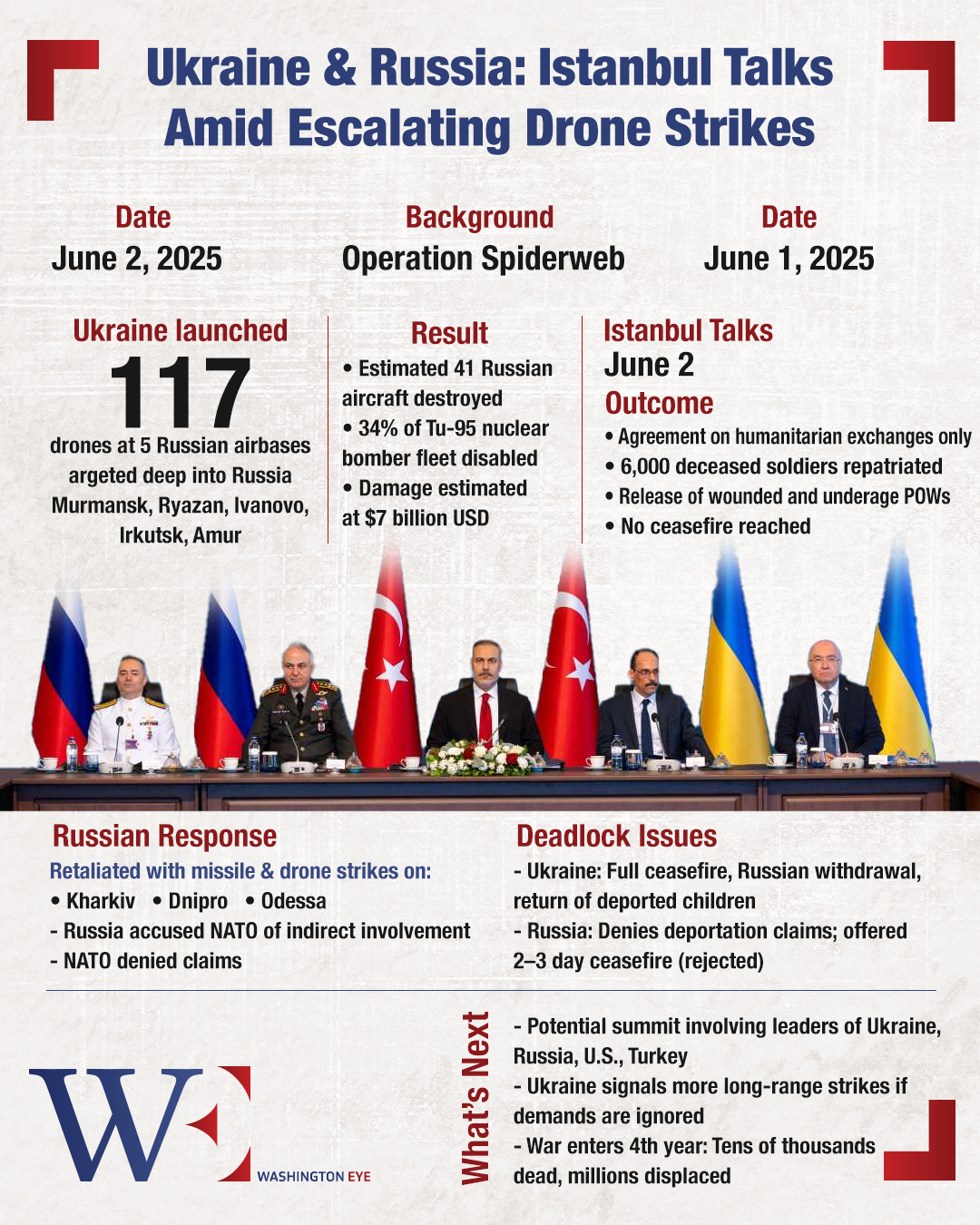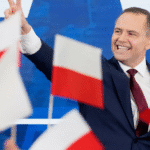In a highly anticipated move, Ukraine and Russia held direct talks in Istanbul on Monday, June 2, 2025, amid the most significant escalation in hostilities between the two countries in months. The meeting came just one day after Ukraine launched a massive drone attack on multiple Russian military airfields in an operation dubbed “Operation Spiderweb,” marking the deepest drone strike into Russian territory since the full-scale invasion began in 2022. However, the talks ended in failure, with no progress toward a ceasefire.
The Istanbul talks were facilitated by Turkey and saw both delegations arrive under high security and intense international scrutiny. Though hopes were cautiously raised, the meeting ultimately delivered only partial results, with agreements on limited humanitarian exchanges but no progress toward a broader ceasefire or resolution.
The backdrop to the talks was Ukraine’s unprecedented drone offensive on Sunday, June 1. The operation involved 117 drones targeting five Russian military air bases, some of which were nearly 4,000 miles from Ukrainian territory. The sites hit included Olenya in Murmansk, Dyagilevo in Ryazan, Ivanovo, Belaya in Irkutsk, and Ukrainka in the Amur region. All five airbases are critical to Russia’s long-range strategic bomber capabilities.
Ukrainian President Volodymyr Zelensky confirmed the operation in a public statement, describing it as “the farthest-reaching and most successful strike” ever conducted by Ukraine’s armed forces. Military analysts estimate that 34% of Russia’s Tu-95 nuclear bomber fleet was destroyed or disabled, along with 41 total aircraft and infrastructure damage worth approximately \$7 billion.
Russia retaliated swiftly with its own large-scale drone and missile attacks across multiple Ukrainian cities, including Kharkiv, Dnipro, and Odessa. The Ministry of Defense in Moscow called Ukraine’s operation “an act of desperation” and accused NATO of indirect involvement, an allegation NATO officials denied.
With pressure mounting from the international community, particularly from the United States and the European Union, both sides agreed to meet in Istanbul on June 2. The discussions were mediated by Turkish diplomats and included observers from the United Nations and the Red Cross.
The talks led to a limited agreement on humanitarian issues, most notably the exchange of 6,000 deceased soldiers from both sides and the release of some wounded and underage prisoners of war. Ukrainian officials hailed the agreement as a “small but meaningful” gesture, while Russian state media characterized it as a “humanitarian success” facilitated by Moscow’s goodwill.
However, key issues remain deadlocked. Ukraine demanded a full ceasefire, withdrawal of Russian forces from occupied territories, and the return of Ukrainian children allegedly deported to Russia. Russia denied the deportation claims and offered a short-term 2–3 day ceasefire only to allow the retrieval of soldiers’ bodies, which Ukraine rejected as insufficient and lacking sincerity. “Russia talks peace while continuing to bomb our cities,” President Zelensky said in a televised address. “We are not interested in temporary pauses that allow the aggressor to regroup. We demand justice, freedom, and the safe return of our children.”
Reactions from global leaders have been mixed. The United States, which played a behind-the-scenes role in encouraging the dialogue, expressed frustration over the limited outcome. The Trump administration has thus far resisted calls from Congress and EU allies to implement stronger sanctions against Russia, focusing instead on facilitating negotiations.
The European Union, particularly countries like Poland, Germany, and France, praised Ukraine’s resilience and called for increased defense aid. French President Emmanuel Macron said, “Peace must not come at the price of Ukrainian sovereignty. We support Kyiv’s calls for a comprehensive ceasefire.”
Turkey’s President Recep Tayyip Erdoğan, whose government hosted the talks, said in a press briefing, “Istanbul remains a bridge between war and peace. While today’s progress is modest, the door to dialogue must remain open.”
Diplomatic sources indicate that talks are still underway to convene a high-level summit involving the leaders of Ukraine, Russia, Turkey, and the United States. However, the logistics, agenda, and likelihood of such a summit remain uncertain amid ongoing battlefield developments. Meanwhile, Ukrainian military officials have hinted at more such long-range operations if Russia refuses to agree to a ceasefire or withdraw from occupied regions.
The war, now in its fourth year, has left tens of thousands dead, millions displaced, and Europe’s security architecture in disarray. While the Istanbul talks showed a faint glimmer of diplomacy, the path to lasting peace remains steep and uncertain. As both sides harden their positions, the world watches closely hoping that what began with drones might somehow end with dialogue. But for now, the guns are still firing.

















